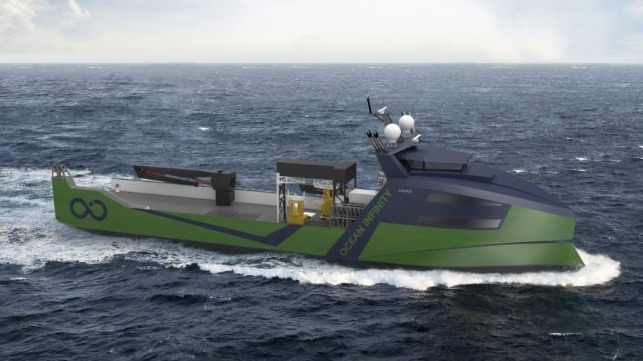
BY THE MARITIME EXECUTIVE 11-23-2020 02:58:30
As part of the industry’s move to the next generation of autonomously operated vessels, the ocean research and survey company Ocean Infinity announced the order for a new generation of larger vessels able to operate remotely controlled or crewed and prepared for future green fuels. To be built at VARD’s shipyard in Vietnam, the eight vessels, which hare believed to be the largest of their kind, are scheduled for deliveries between mid-2022 to end-2023.
Measuring approximately 256 feet in length, the eight Marine Robotic Vessels are designed as a multi-purpose platform that can provide for the safe launch and recovery of remotely operated surface vessels (ROVs), autonomous underwater vehicles, and other robotic systems. They will be equipped with the technology to permit them to operate remotely controlled from onshore, lightly crew or uncrewed. Initially, it is anticipated that they will operate with a skeleton crew on board. The design is also prepared for the introduction of alternative fuels such as green ammonia with fuel cell and battery technology.
“With a high focus in the design process of making the vessels energy efficient, the vessels are equipped with highly optimized hull forms, propellers, and engine arrangements,” said Ove Bjørneset, VP Research and Innovation in VARD. “The vessels are inherently developed for safe and secure prolonged missions with a redundant mindset like split engine and propulsion rooms, redundant cooling systems, sensor systems, automation and power management systems, navigation and communication systems.”
The series of eight vessels will expand Ocean Infinity’s newly launched Armada fleet, which will include nine 21-meter and 36-meter vessels. The smaller vessels are already in production and expected to operational by early 2021.
“The impact and the scale of this robotic fleet will spark the biggest transformation the maritime industry has seen since sail gave way to steam,” said Oliver Plunkett, CEO of Ocean Infinity. “With our new fleet, we will be able to provide sustainable services to all corners of the industry from offshore energy, to logistics and transport.”
Vard Electro, which has developed the SeaQ Integrated Automation System and SeaQ Power Management System together with the class society to allow for safe remote operations and cyber-secure communication, will deliver a complete electrical systems package from engineering through installation, integration, and commissioning. Also, a range of suppliers and contractors in the Norwegian Maritime Cluster is involved in the project.
source: www.maritime-executive.com


